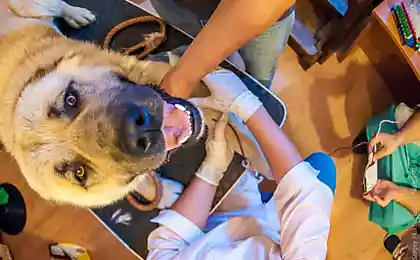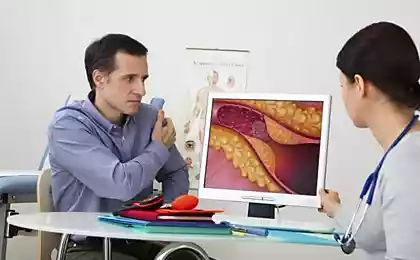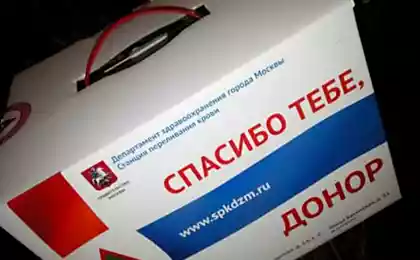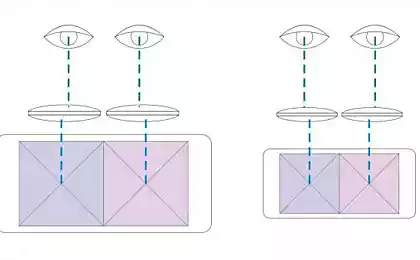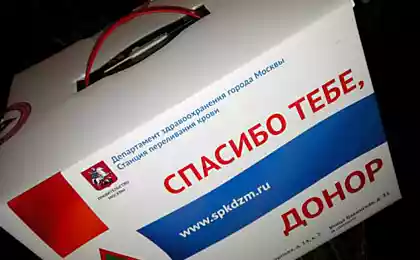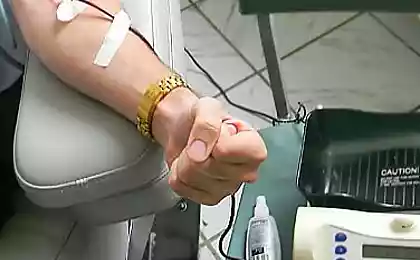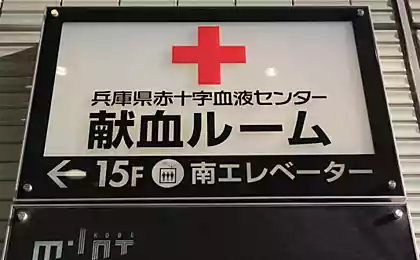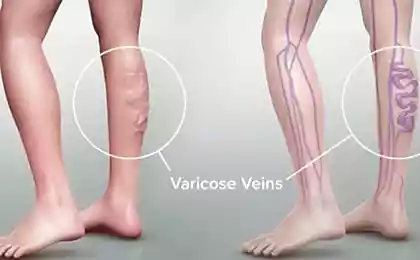1034
If you have never donated blood, then you might be interested in ...
Last week, Sergei share could peep this whole process in our hospital (Russian Children's Clinical Hospital). If you have never donated blood, then you will be interested ...
Here, in the Department of Hematology, are children with serious blood diseases from all over Russia. Often, their lives can be saved only through the transfusion of healthy blood.
At the hospital, 1500 beds, of which 150 for sick children with blood diseases. However, blood is needed not only for the hematology department, but also for oncology, intensive care, surgery and microsurgery department of transplantation of kidneys and bone marrow, burn and maternity departments, etc. Without blood to treat many diseases impossible
19 photos
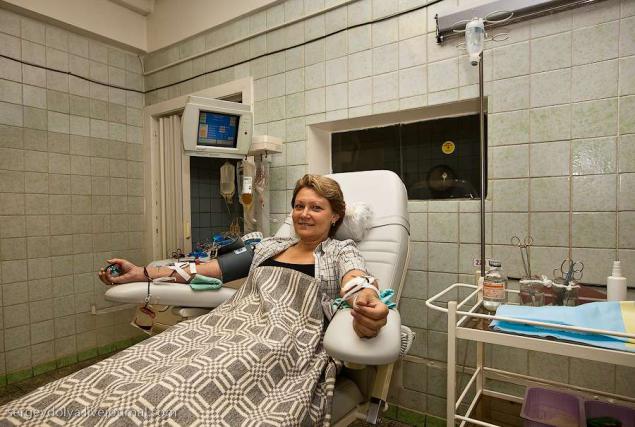
02
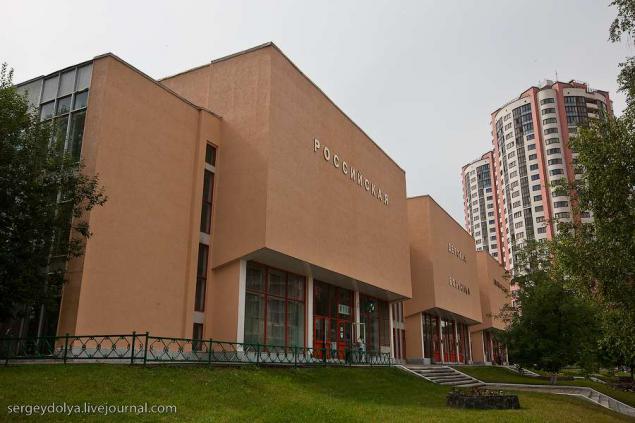
Before becoming a donor, you will need to have an interview with the doctor. There is a huge list of medical contraindications for donation, and the physician should identify them. Even if you come, you still may fail for several reasons, for example, if you weigh less than 50 kilograms.
You also have to pass several tests. And they will need to take before each blood donation, as well as to fill in a short questionnaire:
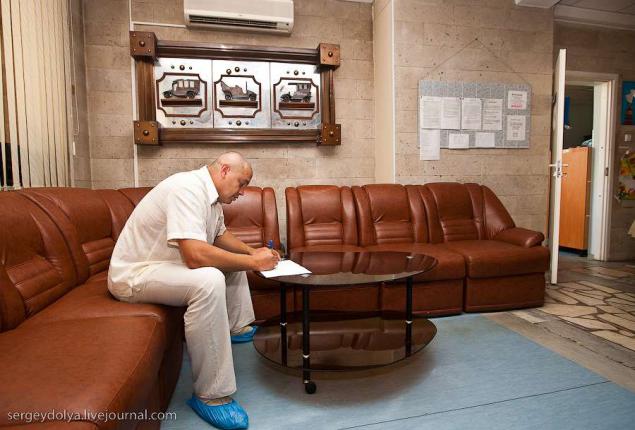
You measure the pressure and to the right of the state of health:
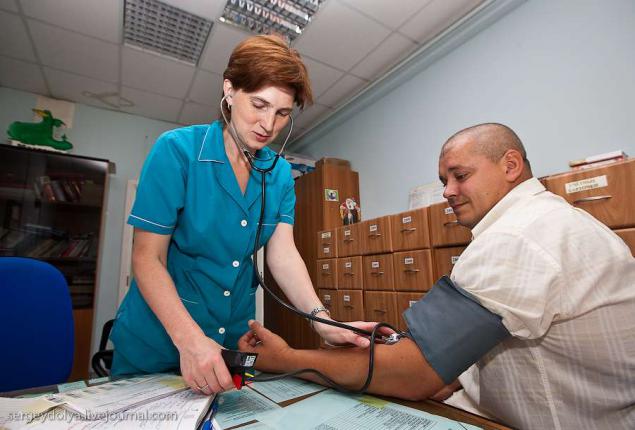
In our hospital pass blood in the operating room 7 seats. When I went there, I have the impression that I was in the TV series "House" - white walls, leather sofas, each donor armchairs monitor ...
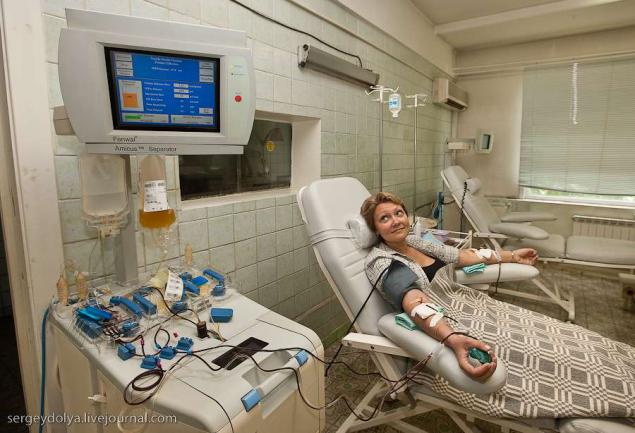
06
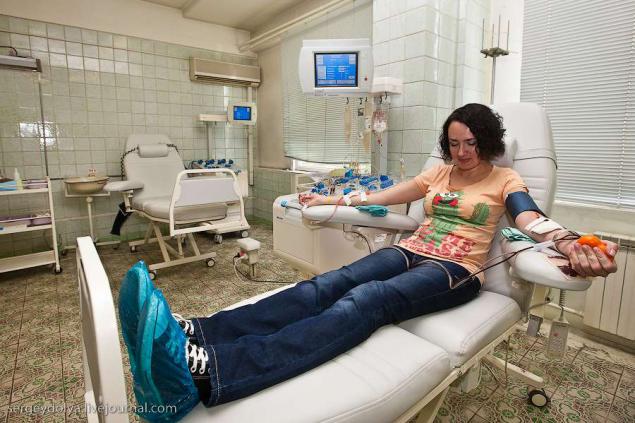
Marat climbed on the sofa donor chair, and the doctor began to set up the equipment:
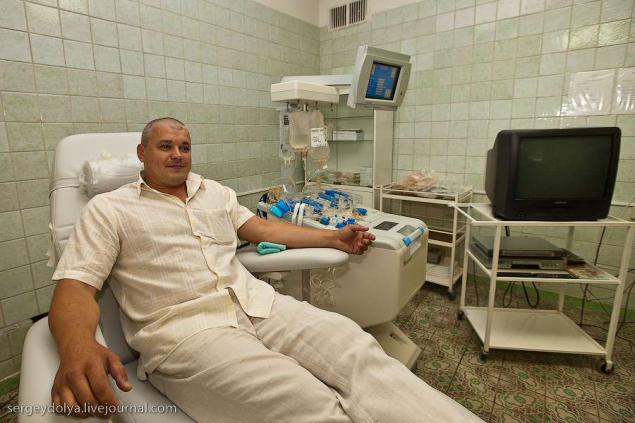
08
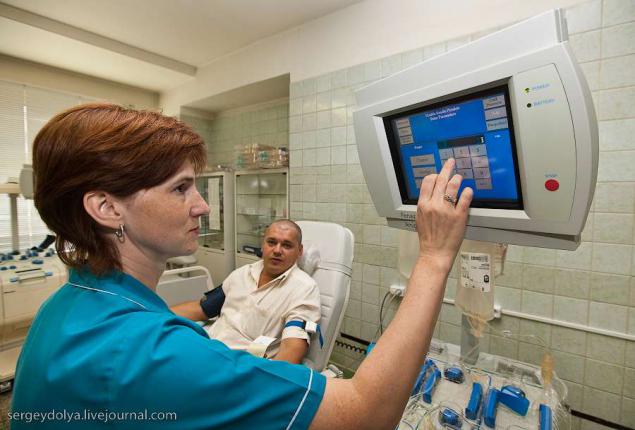
Before you start taking blood, the doctor again took a blood sample.
At this time, Marat took away a little less than 500 milliliters. Generally, in man about 7 liters of blood. To determine the exact number, the boys need to multiply your weight at 0, 07 and receive a full blood volume in liters, and the girls - to 0, 065:
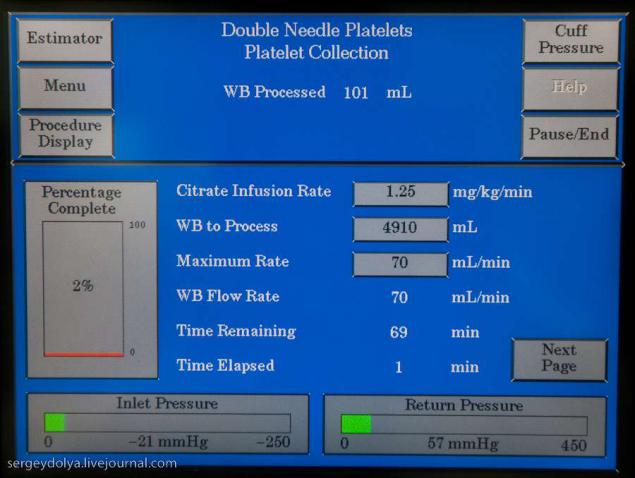
My friend inserted the needle in each hand, and the process began:
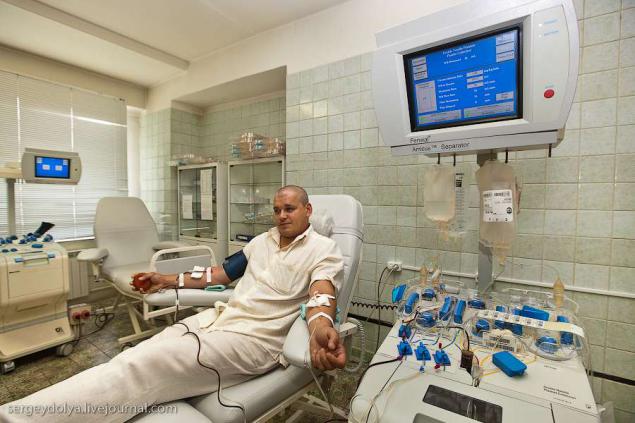
In the process of blood collection must be maintained in a state of maximum vein filling with blood. This is achieved by kneading rubber Expander wrist:
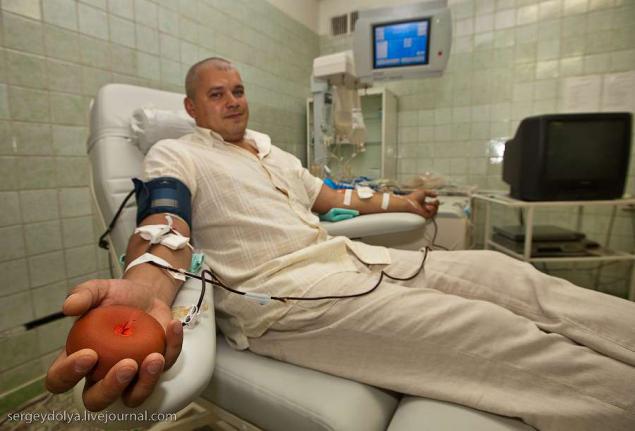
Marat donated blood about six hours. At this time, the doctor conducted a tour for me and told me about the blood.
Blood is composed of plasma and formed elements, which include:
Red blood cells (red cells). They carry oxygen from the lungs to the tissues.
Platelets (yellow). Responsible for blood clotting.
White blood cells (white). Responsible for the protective functions of the organism (immunity)
In human plasma may contain agglutinins α and β, the erythrocytes - agglutinogens A and B, And of the proteins A and α contains one and only one, the same thing - for the protein B and β.
Thus, there are four allowable combinations; then which of them is characteristic of the person determines his blood:
α and β: first (0)
A and β: the second (A)
α and B: a third (
A and B: fourth (AB)
If a person with first blood to pour a second, third or fourth, then begin the destruction of red blood cells (hemolysis massive).
Previously it was thought that the first group of blood suitable for all the rest, the second approach to the second, third and fourth, and the third to its fourth and fourth - only the fourth. Today, each group of blood transfused only to his. In case of emergency it allowed the old approach, but not more than 500 ml of blood of another group.
The cell separator (apparatus for receiving and separating blood components) may be configured so that he took only RBCs (packed red blood cells), plasma or platelets (platelet), or all the blood cells in various combinations and proportions.
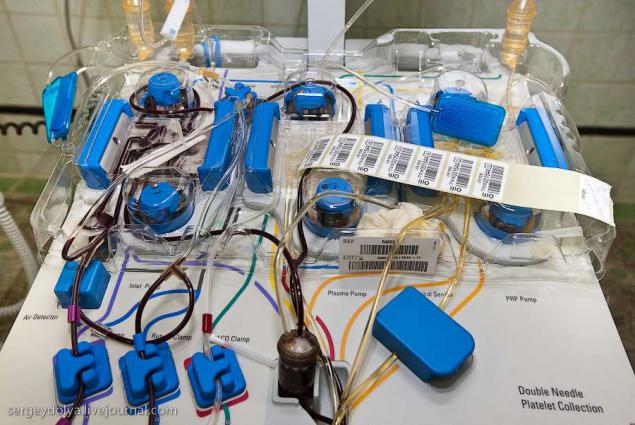
One of the most important elements of blood needed for the treatment of most diseases - it platelets (platelet yellow) - platelet mass dissolved in the plasma:
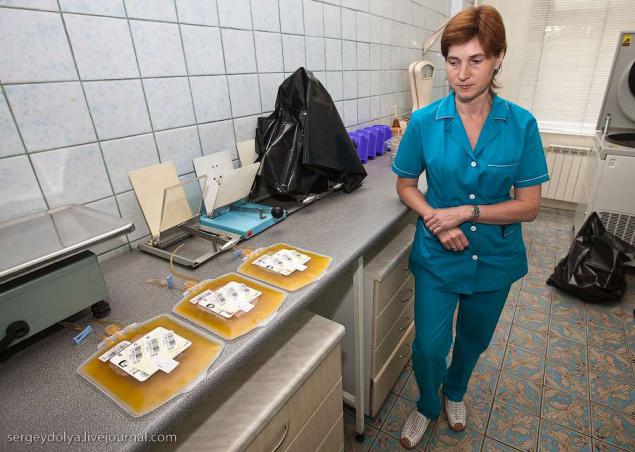
It is important that the platelets are dispersed in the plasma, so they are stored in special cabinets with a constant temperature of 22 where platelet constantly shaken to mass not stuck. The maximum shelf life of platelet to 5 days:
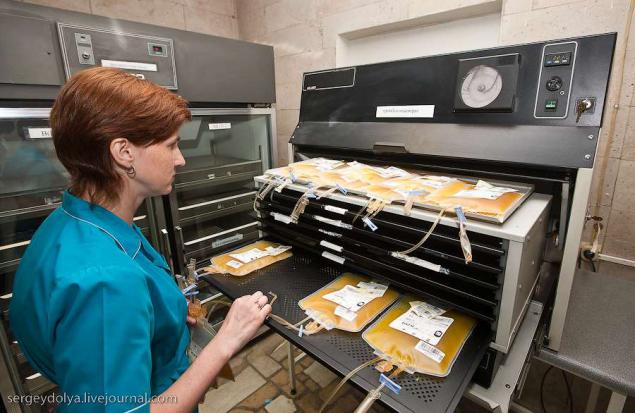
15
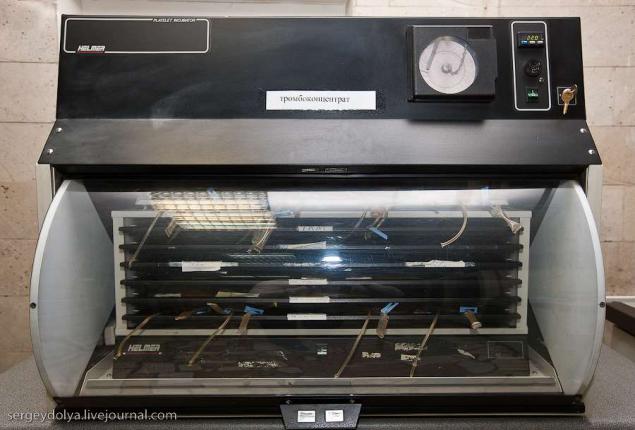
Red blood cells are stored from 21 to 45 days in a special refrigerated cabinets with double walls and the temperature +2 - +6:
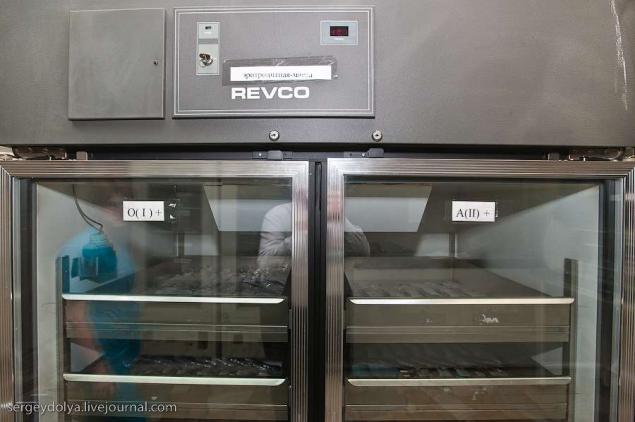
Whole blood is not stored for more than 2 hours. During this time it is subjected to fractionated (separated into components) that are not lost valuable coagulation factors contained in plasma:
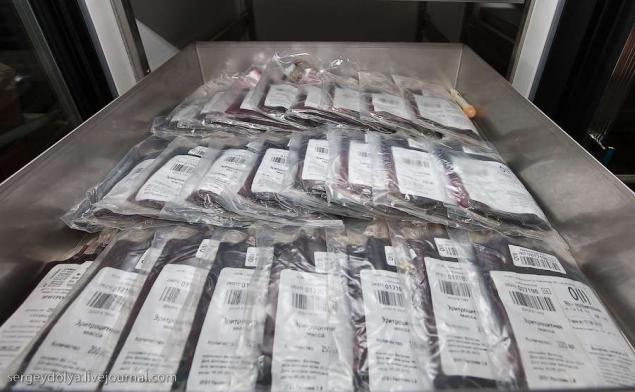
Fresh frozen plasma is stored in special freezers at -40:
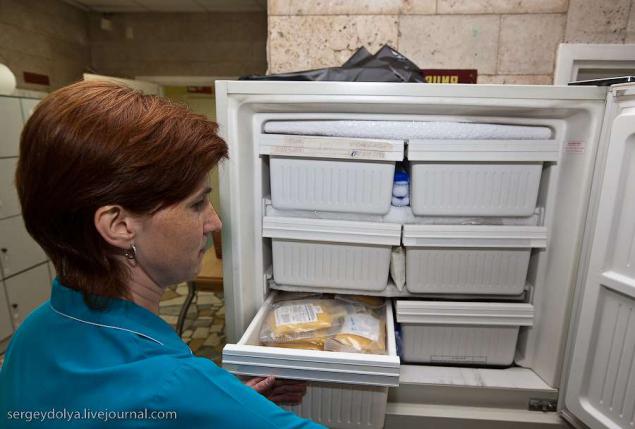
In general, the whole laboratory, and storage of blood takes a little space:
Well, in the end of the article a little bit scary figures.
In 2009, our hospital evaluated for donation of 3 996 people.
Of these donors began 2307 people (the others were rejected for medical reasons).
These 2307 people passed:
217 liters of red blood cell
82 liters of plasma
932 liters of platelet
In this department of blood transfusion was issued:
1088 liters of red blood cell
1262 liters of plasma
932 liters of platelet
The difference hospital had to purchase from other companies. To enable you to assess the "size of the tragedy," I can say that a liter of red blood cell in Moscow is an average of 14 000 and a liter of plasma - 18 000 rubles. Sami can on a calculator to multiply and horrified ....
Each krovootdacha hospital costs by an average of 15 000 rubles. Most donors give blood for free, but the hospital is ready to pay for it. Donors may receive 2,000 rubles for each hardware tromobtsitoferez (no more than 10 times a year). Or 800 rubles for the surrender of the whole blood. Unpaid donors receive food stamp benefits at the local canteen equivalent to 500 rubles.
Each donor is entitled to a day off donations + 1 day of leave or time off in any other day of the year.
If during the life you have given blood more than 40 times, you become "Honorary donor Russia." In this case, you will be provided with the following benefits:
* Annual cash prize of 6000 rubles
* An extraordinary treatment in public hospitals
* Provision of annual leave at a convenient time for you
* Priority purchase of preferential permits.
If you live in Moscow, you will be provided with additional benefits:
* Free travel on all forms of urban transport (except taxis and minibuses)
* 50% discount on utility bills
* Free prosthetics
* 50% discount on the provision of medicines.
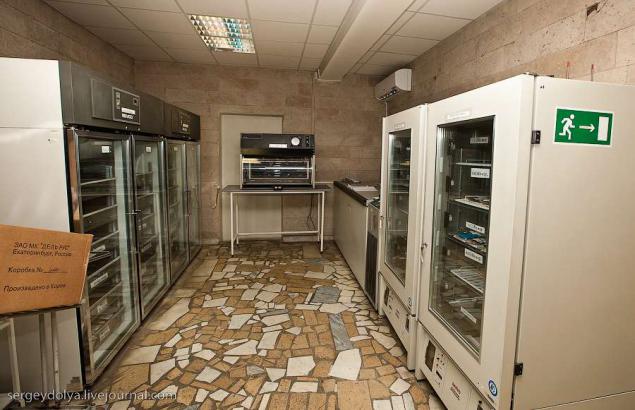
Source:
Here, in the Department of Hematology, are children with serious blood diseases from all over Russia. Often, their lives can be saved only through the transfusion of healthy blood.
At the hospital, 1500 beds, of which 150 for sick children with blood diseases. However, blood is needed not only for the hematology department, but also for oncology, intensive care, surgery and microsurgery department of transplantation of kidneys and bone marrow, burn and maternity departments, etc. Without blood to treat many diseases impossible
19 photos

02

Before becoming a donor, you will need to have an interview with the doctor. There is a huge list of medical contraindications for donation, and the physician should identify them. Even if you come, you still may fail for several reasons, for example, if you weigh less than 50 kilograms.
You also have to pass several tests. And they will need to take before each blood donation, as well as to fill in a short questionnaire:

You measure the pressure and to the right of the state of health:

In our hospital pass blood in the operating room 7 seats. When I went there, I have the impression that I was in the TV series "House" - white walls, leather sofas, each donor armchairs monitor ...

06

Marat climbed on the sofa donor chair, and the doctor began to set up the equipment:

08

Before you start taking blood, the doctor again took a blood sample.
At this time, Marat took away a little less than 500 milliliters. Generally, in man about 7 liters of blood. To determine the exact number, the boys need to multiply your weight at 0, 07 and receive a full blood volume in liters, and the girls - to 0, 065:

My friend inserted the needle in each hand, and the process began:

In the process of blood collection must be maintained in a state of maximum vein filling with blood. This is achieved by kneading rubber Expander wrist:

Marat donated blood about six hours. At this time, the doctor conducted a tour for me and told me about the blood.
Blood is composed of plasma and formed elements, which include:
Red blood cells (red cells). They carry oxygen from the lungs to the tissues.
Platelets (yellow). Responsible for blood clotting.
White blood cells (white). Responsible for the protective functions of the organism (immunity)
In human plasma may contain agglutinins α and β, the erythrocytes - agglutinogens A and B, And of the proteins A and α contains one and only one, the same thing - for the protein B and β.
Thus, there are four allowable combinations; then which of them is characteristic of the person determines his blood:
α and β: first (0)
A and β: the second (A)
α and B: a third (
A and B: fourth (AB)
If a person with first blood to pour a second, third or fourth, then begin the destruction of red blood cells (hemolysis massive).
Previously it was thought that the first group of blood suitable for all the rest, the second approach to the second, third and fourth, and the third to its fourth and fourth - only the fourth. Today, each group of blood transfused only to his. In case of emergency it allowed the old approach, but not more than 500 ml of blood of another group.
The cell separator (apparatus for receiving and separating blood components) may be configured so that he took only RBCs (packed red blood cells), plasma or platelets (platelet), or all the blood cells in various combinations and proportions.

One of the most important elements of blood needed for the treatment of most diseases - it platelets (platelet yellow) - platelet mass dissolved in the plasma:

It is important that the platelets are dispersed in the plasma, so they are stored in special cabinets with a constant temperature of 22 where platelet constantly shaken to mass not stuck. The maximum shelf life of platelet to 5 days:

15

Red blood cells are stored from 21 to 45 days in a special refrigerated cabinets with double walls and the temperature +2 - +6:

Whole blood is not stored for more than 2 hours. During this time it is subjected to fractionated (separated into components) that are not lost valuable coagulation factors contained in plasma:

Fresh frozen plasma is stored in special freezers at -40:

In general, the whole laboratory, and storage of blood takes a little space:
Well, in the end of the article a little bit scary figures.
In 2009, our hospital evaluated for donation of 3 996 people.
Of these donors began 2307 people (the others were rejected for medical reasons).
These 2307 people passed:
217 liters of red blood cell
82 liters of plasma
932 liters of platelet
In this department of blood transfusion was issued:
1088 liters of red blood cell
1262 liters of plasma
932 liters of platelet
The difference hospital had to purchase from other companies. To enable you to assess the "size of the tragedy," I can say that a liter of red blood cell in Moscow is an average of 14 000 and a liter of plasma - 18 000 rubles. Sami can on a calculator to multiply and horrified ....
Each krovootdacha hospital costs by an average of 15 000 rubles. Most donors give blood for free, but the hospital is ready to pay for it. Donors may receive 2,000 rubles for each hardware tromobtsitoferez (no more than 10 times a year). Or 800 rubles for the surrender of the whole blood. Unpaid donors receive food stamp benefits at the local canteen equivalent to 500 rubles.
Each donor is entitled to a day off donations + 1 day of leave or time off in any other day of the year.
If during the life you have given blood more than 40 times, you become "Honorary donor Russia." In this case, you will be provided with the following benefits:
* Annual cash prize of 6000 rubles
* An extraordinary treatment in public hospitals
* Provision of annual leave at a convenient time for you
* Priority purchase of preferential permits.
If you live in Moscow, you will be provided with additional benefits:
* Free travel on all forms of urban transport (except taxis and minibuses)
* 50% discount on utility bills
* Free prosthetics
* 50% discount on the provision of medicines.

Source:



